- Mixing Media
- Posts
- My Top Novels 2024
My Top Novels 2024
2024 was a strange reading year for me. I read some truly excellent books this year, with a noted bump in my ratings from 2023. All told though, I only read 18 books (excluding manga and comics). However, there were easily that many books that I started to read only to abandon partway for a variety of reasons. Some of the books that I never finished were some of my favorites, and I have no clear reason why I couldn’t finish them when I was able to finish others that I enjoyed markedly less.
Yet at the same time, I do understand to some degree. To engage with a work that truly moves you, truly draws you in, can involve a level of emotional engagement that I simply don’t always have the time for. 2024 was a busy year for me. I graduated law school, took the bar exam, and started a new job. It was simpler at times to just pick up something that expected less of me. As we head into the new year, it’s my goal to do less of that. To stick with the things I start and to see them through, for better or worse. Whatever your goals for the year are, I hope you’re able to stick with them as well. Without further ado, my top books of 2024
Honorable Mentions
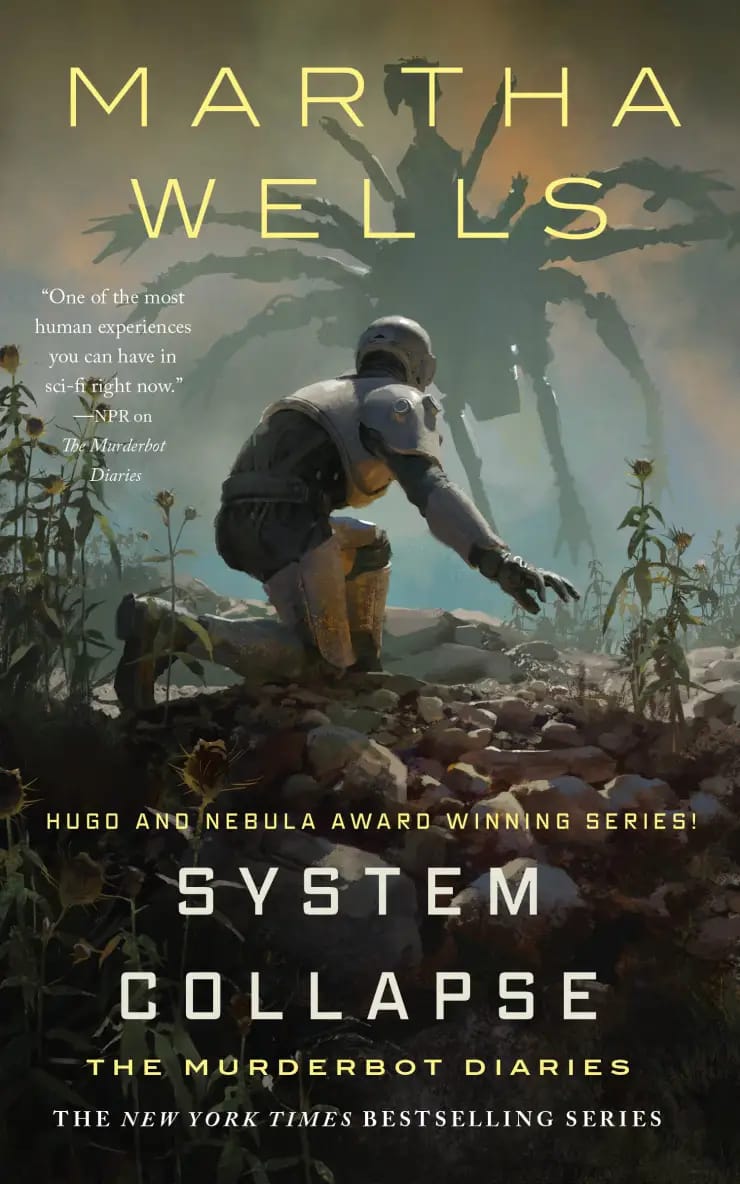
System Collapse by Martha Wells (Murderbot 7). Published 2023; Tor Books; 256 Pages. 4⭐ Murderbot follows the eponymous android who has gained control of its programming as it works to protect its found family. Following the events in the previous novel, Network Effect, Murderbot is left grappling with trauma from what occurred while still needing to be on the top of its game as a security agent. To top it off, Murderbot has to deal with corporate politics, isolated colonists, and a group of academics it doesn’t fully trust yet. As the story unravels, Murderbot is pushed to its limits to keep both itself and its charges safe.
This is the second full length novel in the Murderbot series. To be fair to the book and author, I probably overhyped myself waiting to read this one given the intense impact that previous books in the series had on me. This failed to reach the highs of its predecessors, but even a weaker entry in the series is still superb. To some extent, I wish that this book had been a novella, but seeing Murderbot acting as part detective, part bodyguard, and part mediator was highly entertaining. This book had less action than previous entries, and I think it’s emblematic of the SecUnit’s growth. Murderbot can’t always just solve its problems with violence now, it also has to be able to negotiate human politics and cater to the emotions of those around it. While it is annoyed by this development, the fact Murderbot is able to do so shows just how far its come.
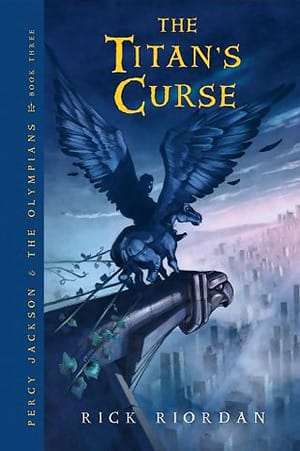
The Titan’s Curse by Rick Riordan (Percy Jackson and the Olympians 3). Published 2007; Disney Hyperion; 352 pages. 4.5⭐ The Titan’s Curse follows Percy at one of his lowest moments. Following a demigod recruitment mission gone wrong, Percy’s best friend Annabeth is captured by the agents of Kronos. According to the Oracle, there are only a few days for Percy to gather a team and save her before Annabeth is lost forever.
Anyone I’m friends with was almost certainly a Percy Jackson kid at some point. Following the premier of the new show, I’ve been rereading the books with my partner. Of the ones we’ve gotten through, Titan’s Curse is certainly the strongest. The stakes have never been higher, and the crew has never had to face such a competent opponent. To make matters worse, they have to make due without their mastermind, Annabeth. Additionally, the world of demigods greatly expands in this book, and we get to know the incredible character that is Thalia Grace. You can almost see the gears turning in Rick’s head as he realizes that he’s building not just a storyline, but a whole world. As the series goes, it becomes clear that Rick is becoming more confident writing at this level. For as bloated as the series becomes, here at its roots it’s still strong.
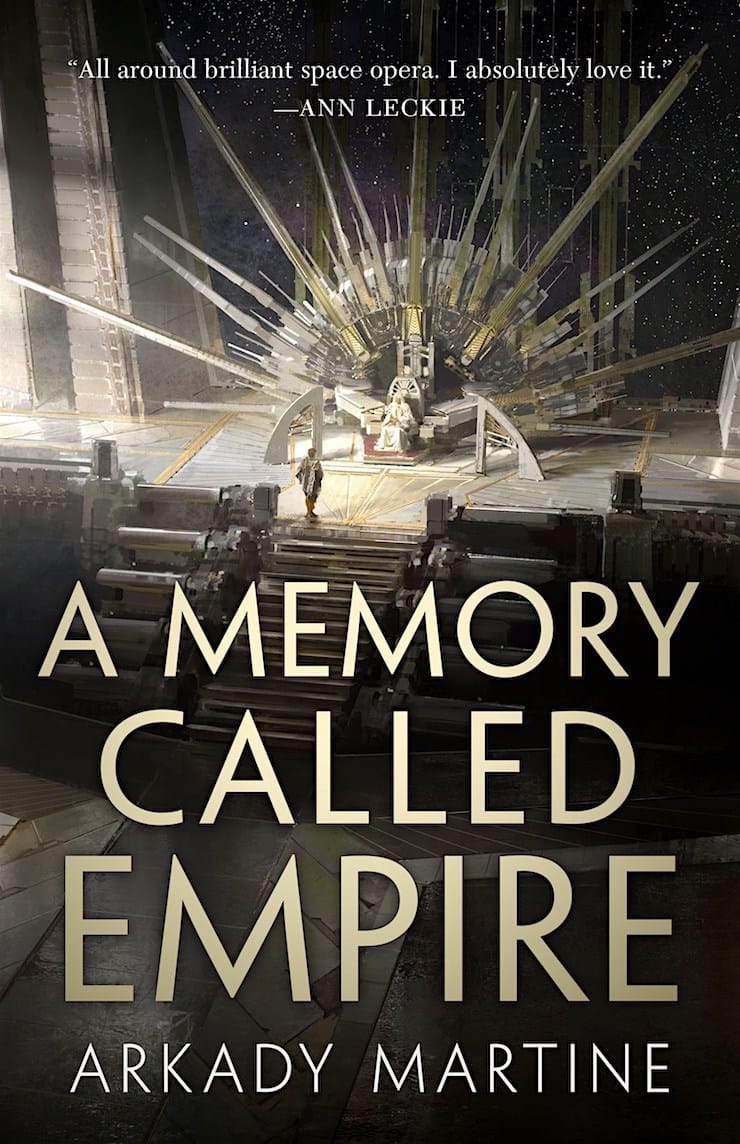
Could an institution that made such a neat throne be evil?
A Memory Called Empire by Arkady Martine (Teixcalaan #1). Published 2019; Tor Books; 448 pages. 4.5⭐ Ambassador Mahit Dzmare is sent from her small yet independent mining station to the heart of the Teixcalaanli Empire only to discover that her predecessor is dead. With people from both the Station and the Empire trying to sabotage her, it is up to Mahit to discover the secrets her predecessor left behind and to forge new connections of her own to discover what exactly is going on in Teixcalaan. If she fails, both of her new and old home could face catastrophe.
There is so much good about this book that is hard to put into words. I picked it up expecting a murder mystery, and failing that a book about political intrigue. In part, it is both those things, but neither are what makes the book shine. In truth, this is a book about culture shock and cultural warfare. Mahit finds herself thrust into a world that she’s dreamed of and intensely studied, but consistently finds herself butting against the edges of her expectations compared to the reality of the Empire. Texicalaan is a beautifully imagined space, yet simultaneously is a cold, unfeeling bureaucracy. The Empire looks down on her, and looks at that which is other as backwards (Mahit is consistently referred to as a barbarian). What is done in Texicalaan is seen as right, just, and natural, the way things are and should be. It maintains this order through military, cultural, and religious might. There’s a sense of inevitability in the way both those from and outside the Empire talk about its expansion, be that with joy, boredom, or bitterness. Living inside a cultural empire, it’s worthwhile to take these messages to heart, and I’ve found myself returning to and chewing on these themes again and again. Oh, and the book’s pretty solid with the sci-fi elements too.
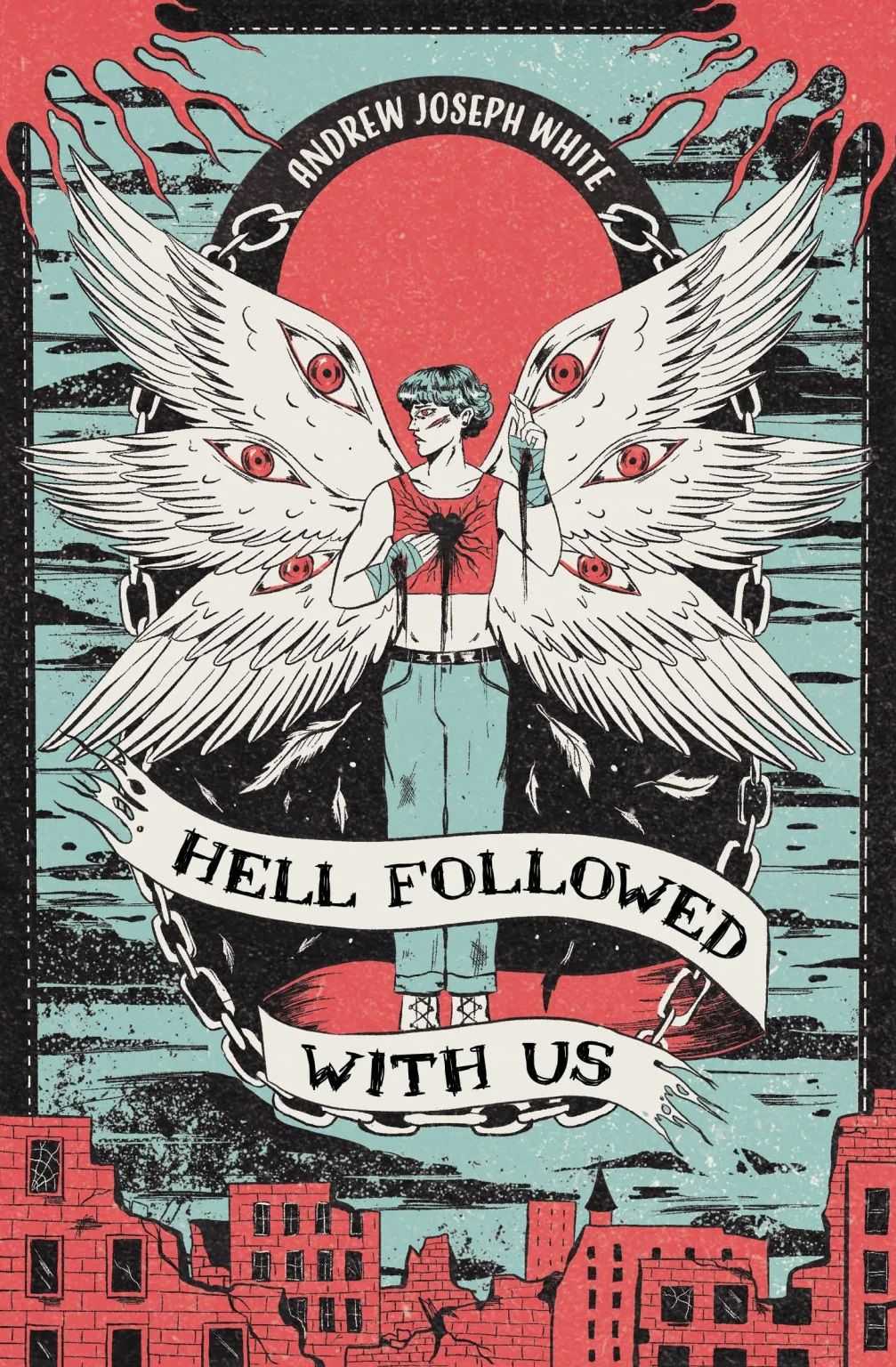
Probably the best cover art of any book I read this year
Hell Followed With Us by Andrew Joseph White. 2022; Peachtree; 416 pages. 5⭐ 16-year-old Benji is on the run. He’s on the run from the apocalyptic cult that raised him, that refuses to accept his identity as a man, and that wants nothing more than to turn him into a monster. They have already succeeded in destroying most of the world and bringing many of the survivors to heel, but Benji has to believe that there’s an escape. He manages to find salvation at the ruins of an LGBTQ+ resource center, but the longer he stays, the more the cult closes in and the more the monster they placed inside him is forcing its way out.
It makes me sick to not have this book higher or even ranked on my list, but the shameful truth is that I never finished this book. Depending on how it closed out, this could have been my number 1 of the year, but between library due dates, external obligations, and personal hang-ups, I couldn’t get this book done in 2024. Part dystopian, part body horror, this book does such an exceptional job portraying the trans identity of the main character and using the body horror elements to tie into the theme. Throw in good messaging on far-right fundamentalism and climate change, some great (horrifying) creatures, and a cute love story, what more can you ask for? The book is YA, and some things do feel a little plot-convenient at times, but in many ways that made the book more enjoyable for me. For as dark as this book can get at times, seeing the characters be dorky or for a convenient deus ex machina moment to happen added some much needed levity to my reading experience. I cannot recommend this book highly enough.
My Top 5 Novels of 2024
Number 5: Babel
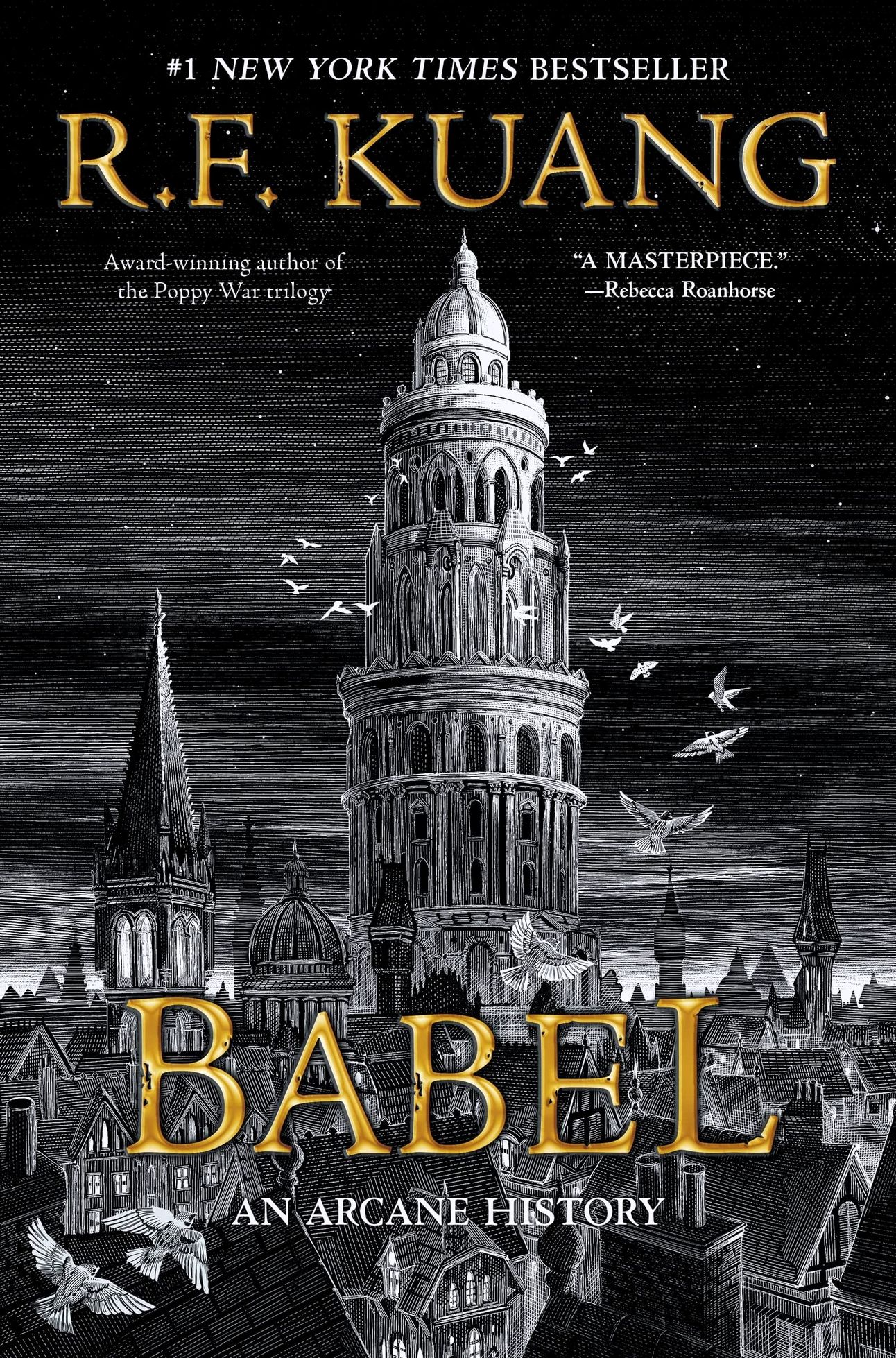
By R.F. Kuang. 2022; Harper Voyager; 544 pages. 4.5⭐In an alternate England, young orphan Robin Swift is taken from his native land of China to the shores of England to become a learned man. Under the tutelage of Professor Lovell, he is taught all the virtues of a gentleman and how to be a scholar. Eventually, he is brought to the Linguistics Program at Oxford to work magic. Here, magic is made by inscribing two words of different languages on bars of silver. In the gap between the words meanings, magic is born. This magic fuels the empire, from cleaning its water to curing the sick to powering its weapons. At first, Robin is swept up in the beauty of academia and the newfound friends he makes. But as England’s needs grow, its teeth sharpen, and Robin has to contend with how much he is willing to be used as a tool for empire.
This was a book that I was really high on after finishing that has sadly soured over time. When I first finished, I gave it 5 stars; if I were to be entirely honest about how I feel now, I would give it 4 stars, so meeting in the middle seems appropriate. The way the magic works in this world truly amazed to me. As someone who is fascinated by, if extremely uneducated in, linguistics, this book scratched an itch I didn’t even know I was looking for. Kuang is an extremely strong writer, and it’s clear that she brought in a lot of her own personal knowledge (and feelings) from her own time at Oxford. The book is anti-imperialist in a way that I find extremely engaging. Once again, another book that discusses how Empire corrupts, corrodes, and consumes. But what left me unsatisfied, and increasingly so after reading her earlier work the Poppy Wars, is the fact that Kuang seems deeply cynical towards things improving. That is perhaps an uncharitable read of the work, and there’s only so much that can be done when working in the confines of historical fiction, but for as well crafted and excellent this book is, it also leaves a bitter taste in my mouth. Time and again, Kuang seems to shoot down the idea that mechanisms such as academia, political struggle, or community organizing can bring about true change in the face of concentrated power. One thing is for sure, it’s a book I’ll be thinking about for a long time to come.
Number 4: The Way of King
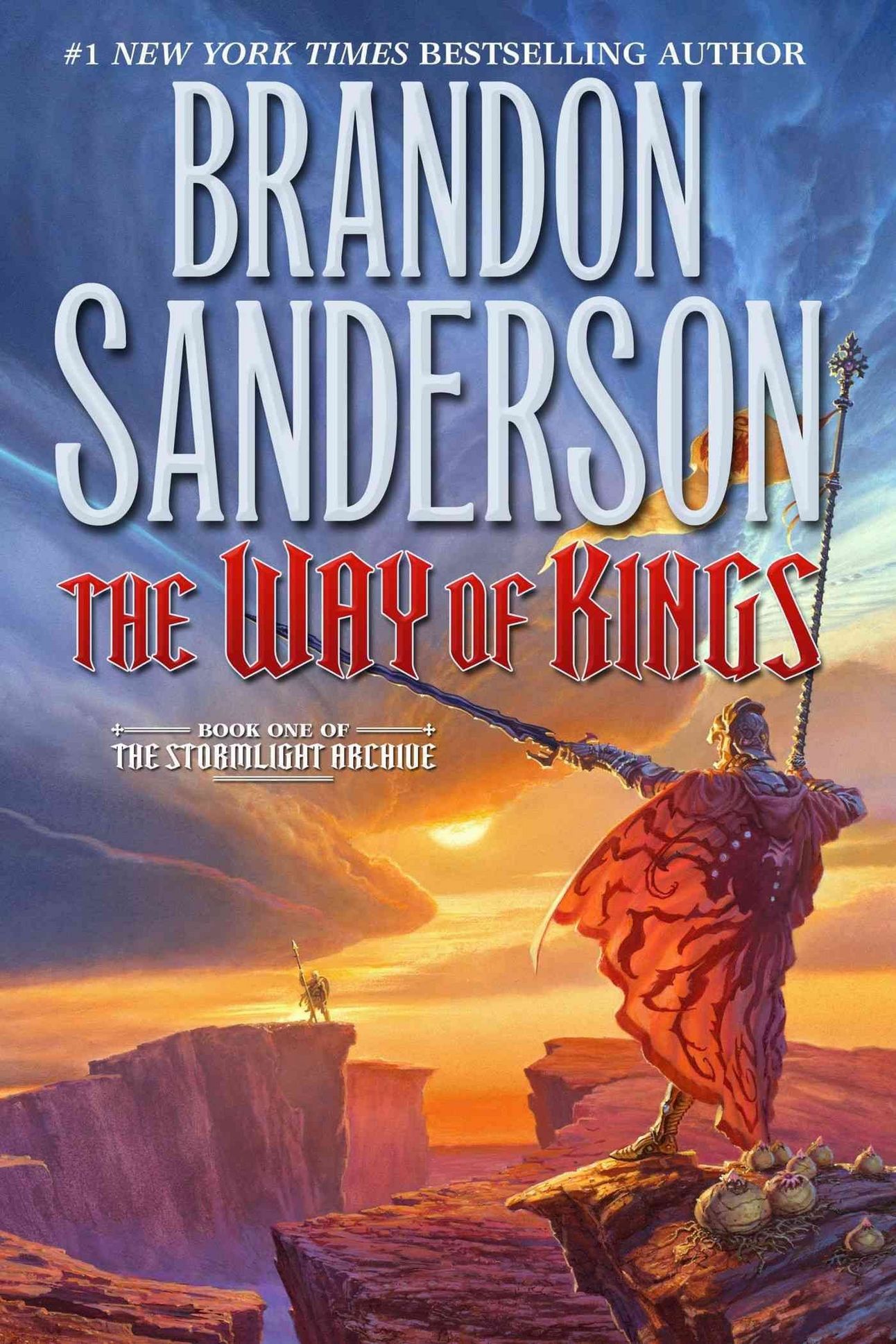
By Brandon Sanderson (The Stormlight Archives #1). 2010; Tor Books; 1007 pages. 4.5⭐Set in a world beset by magical storms, the Stormlight Archives follows the revival of an order of legend known as the Knights Radiant. Those called to be a Knight Radiant must come together to stop a malignant god set on causing the apocalypse. But that’s getting ahead of things. In this book, we meet three core characters: Kaladin Stormblessed, Shallan Davar, and Dalinar Kholin as they gradually become aware of their callings. Kaladin is a slave; he’s been through hell and forced time and again to see those he tries to save die. Eventually, he’s sold to the military to act as a bridgeman; the human shields carrying massive bridges that allow battles to happen in a brutal war of retribution. The world wants Kaladin to die, and while he struggles to care for his own life, Kaladin decides to try one final time to save the people around him. Across the battlefield, Dalinar Kholin is part of why there is a war in the first place. Brother to a murdered king, Dalinar and his people seek vengeance against the Parshendi who orchestrated the assassination. But with the war dragging out for years, Dalinar has become increasingly concerned with the state of affairs in his nation, and he is haunted by his brother’s death and final words. As he searches for answers, he is left wondering if his questions are driving him insane. Across the world, Shallan Davar attempts to save her beleaguered noble house from ruin. She seeks apprenticeship under Jasnah Kholin, Dalinar’s niece and sister to the king. With such an apprenticeship, Shallan could be thrust into high society with connections and wealth galore. She hopes that this will help to disguise her true purpose: to steal Jasnah’s greatest treasure.
This book was a beast that took me three months to finish. Brandon Sanderson is the hottest name in fantasy today, and with books like this it’s not hard to see why. His books are written in a way that’s approachable (despite their length) and he writes about themes and morals that just about anyone can get down with. His output is also insane. I don’t think that this book quite lived up to the hype for me, and Sanderson’s writing leaves a lot to be desired from me, but it’s impossible to deny the ambition of this book. Throughout, it’s clear that Sanderson is grappling with his own religious beliefs, and seeing that play out is fascinating. World building is his strong suit, and the world of Roshar does not disappoint. It is a harsh world beset by storms where things grow from rock rather than soil. Little spirits (not entirely accurate but close enough) called spren inhabit the world, causing little tricks and delights at times, but also signifying things like anger, pain, and death. Sanderson takes pains to create a grounded magic system, and while interesting, it doesn’t get much chance to really shine in this book. So much time is spent setting pieces up, it feels like the book is half over before the action gets going. And with a book this large, that’s a tall order. Yet I can’t deny that the finale of this book moved me. Kaladin really grows throughout the course of the story, and it’s gratifying that in this book, goodness is almost always rewarded. It can be a bit cliche and trite at times, but in many ways this book is like Thanksgiving. None of the food is your favorite, there’s far too much of it, but the atmosphere leaves you enjoying things just the same.
Number 3: The Will of the Many
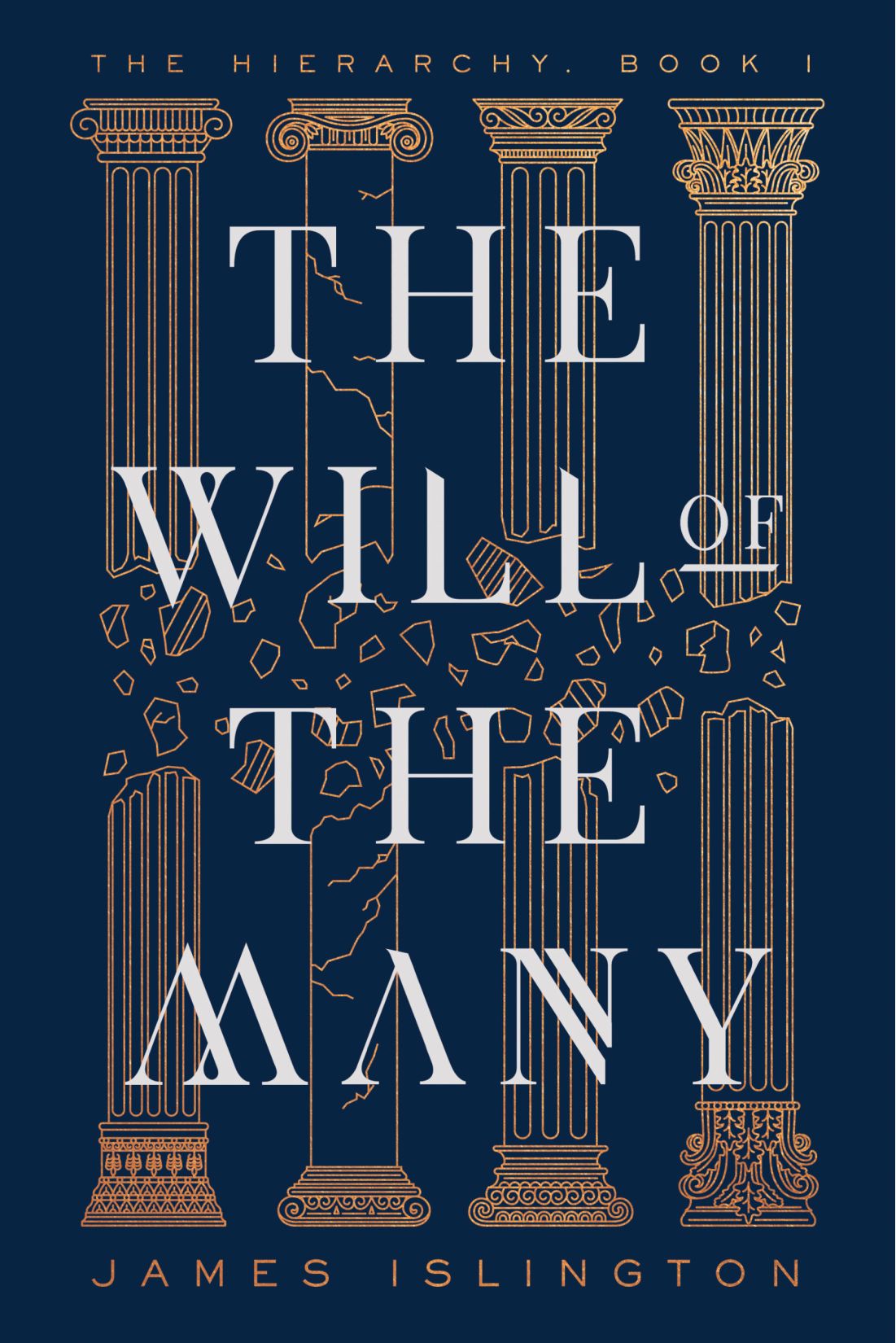
By James Islington (Hierarchy #1). 2023; Saga Press; 639 pages. 5⭐Vis Solus is doing what he must to stay alive. A fugitive in the Catenan Republic, he is trying his best to stay under the radar. Each person in Catenan is expected to cede part of their lifeforce, their Will, to those in the caste above them. Vis has managed to escape doing so thus far, but his competence and refusal to bend the knee end up drawing the attention of higher powers. He is adopted by a Patrician family and they use him to infiltrate the Academy, where the richest and brightest in Catenan gather to become rulers. But Vis has ulterior motives of his own. Prince of a nation destroyed by Catenan, he harbors a rage that is building, and that one day he hopes will tear the Hierarchy down.
This book is highly derivative, let’s get that out of the way. For anyone who’s experienced the Dark Academia or Magic/Murder School tropes, this books is gleefully dancing in that tradition, following the likes of Name of the Wind, Red Rising, and even Gideon the Ninth. But it’s hard to care about any of that when a book is this well executed. I was grabbed by the throat and managed to finish this book in about a day despite its size. A thoroughly enjoyable read that is an exemplar of this type of book. Vis is a Mary Sue, but also there’s more realistic grounding for his competency than often given to this type of character. Also, Islington is not afraid to make Vis fail and fail spectacularly at times. The book sadly doesn’t hold your hand in the worldbuilding, and I was forced to go to the author’s website to see a world map, which is tedious when locations are frequently mentioned and often important. While the Will system seems fairly straightforward (each caste level gives increasing amounts of energy to the people above, making them stronger and hardier) Will is also used to power dirigibles and control automatons in ways that are never explained to the reader. The final act of the book also flips the table in many ways, creating new questions, providing few answers, and bending the world in ways unimaginable. The ending goes all in, and it will be up to the rest of the series to see if that bet pays off in the long run, but this first book was enjoyable as hell.
Number 2: This is How You Lose the Time War
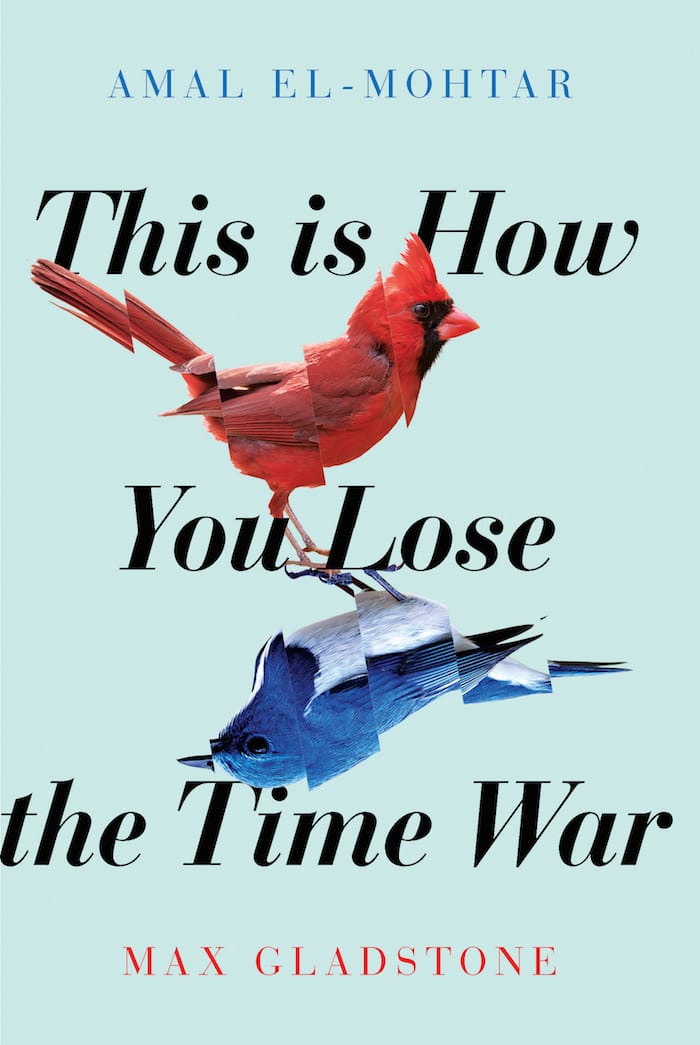
By Amal El-Mohtar & Max Gladstone. 2019, Saga Press; 209 pages. 5⭐ From the distant future to the farthest strands of the past, Red and Blue chase each other. Top agents from two warring timelines, Red and Blue are tasked with pruning the strands of fate to the betterment of their respective civilizations. At first, their relationship begins as a game of one-upmanship, then to a mutual respect, and finally to a deep love and longing. These two agents write to each other through time and space, sharing the deepest parts of themselves to the only person who can understand their experience. But it is imperative that they are not caught, by their adversaries or their own agencies, because if that were to happen, not only might they be destroyed, their love could be turned into a weapon.
First, having read a lot of big books this year, having a shorter read was a treat. An epistolary novel through time and space, we see the relationship between Red and Blue blossom, their love grow and deepen, without the two ever having a chance to interact in person. The authors are able to capture so deeply a sense of longing, that feeling of first love and infatuation, in a way that is deeply beautiful. There is plot and worldbuilding here, and let me be clear, those elements are enjoyable. But the prose and character work of the two leads is where this book truly shines. These are love letters through the ages, what Shakespeare meant by the term star-crossed lovers, a form of true devotion and love that is rare to find put to print. It can be messy and trite and flowery, but none of that is a detriment because at the end of the day that’s what love is at times. And few books I’ve read have ever done love better.
Number 1: Chain-Gang All-Stars
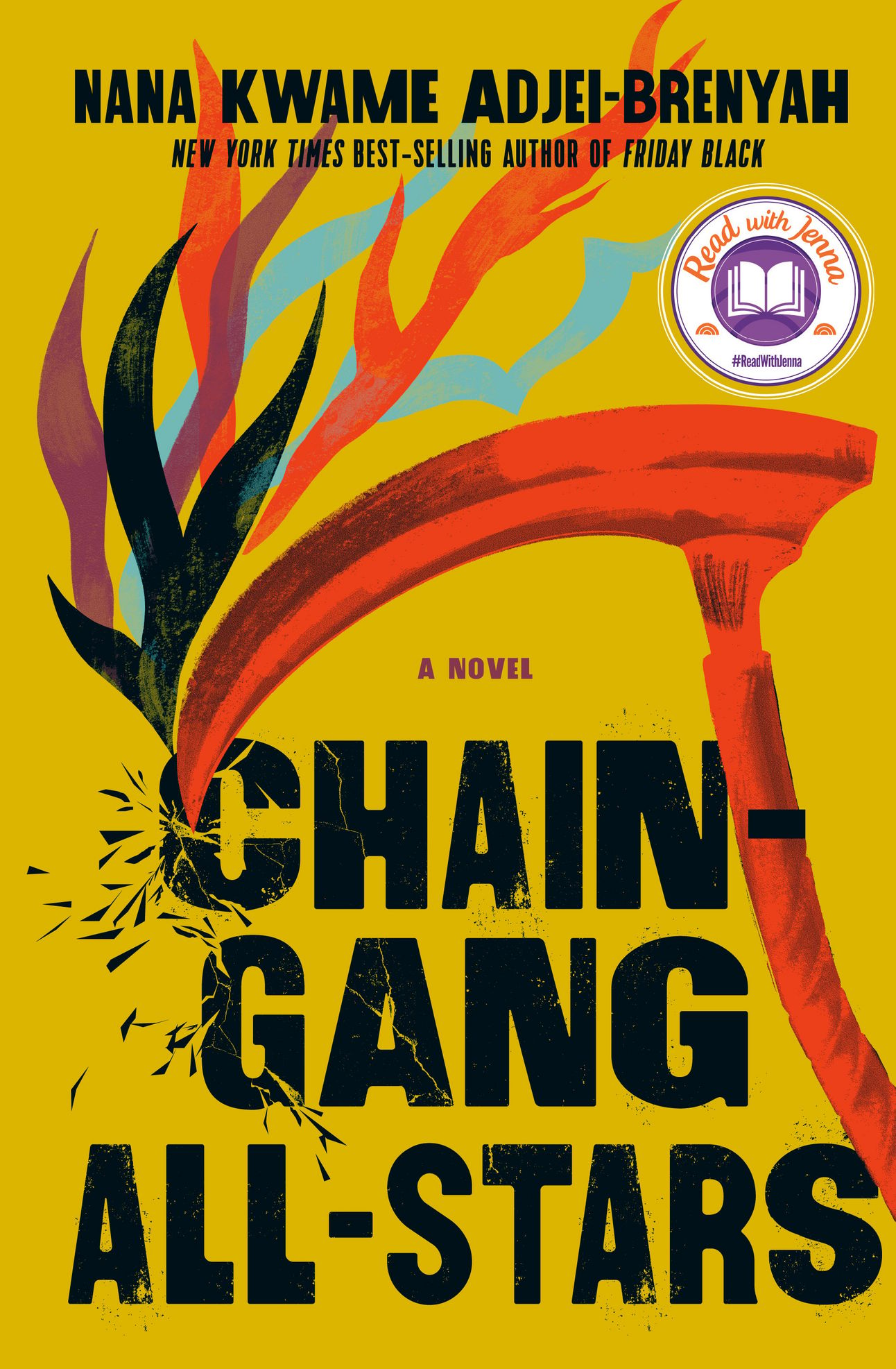
By Nana Kwame Adjei-Brenyah. 2023; Pantheon; 367 pages. 5⭐In the near future, Criminal Action Penal Entertainment (CAPE) is the hottest thing in the country. Prisoners are offered a chance to enter the games. Stay winning, and no matter the sentence you’ll go free in a few years. Lose, and you die. Loretta Thurwar is at the top of her game, both in terms of popularity and in the fact that she’s mere weeks to freedom. At her side is her lover, her rock, Hamara “Hurrican Staxxx” Stacker. As her freeing day nears, Loretta is forced to consider the legacy she leaves behind, how she wants the members of her team to be treated once she’s gone, and to decide if she’s even ready for freedom. As the book goes on, you see perspectives of guards, viewers, CAPE executives, and protesters to learn more about how the world got this way. Most of all, those in charge can never let power be ceded to the product.
This, this, this. This is a book I want to shout from the rooftops, to become an evangelist for. This is one of the most compelling pieces of abolitionist literature I’ve ever read. The book explores to the fullest what it means to have an organized system in this country that profits dehumanization. Once prisoners are no longer people, it’s believable that we could live in a world where we turn them into sport. We already make them firefighters, slave labor, and worse. The book also doesn’t shy away from the fact that not all the people here are “good people.” Many of the criminals have done horrible things, even horrible things to people they love, but none of that makes them inhuman. Hate can only beget hate. It takes love, true hopeful love to cut through that. So at the end of the day, we’re left asking, why do we build our systems on hate? Coming into 2025, this question is more prescient than ever, and more often than not it can seem like hate is winning. But love is the only way through.
That’s a wrap on this year. I hope to read even more books in 2025, and there’s a good chance that a certain unfinished book from this year ends up on the best for 2025. If you enjoy this, tell a friend. I’d love to see this grow.
Soma